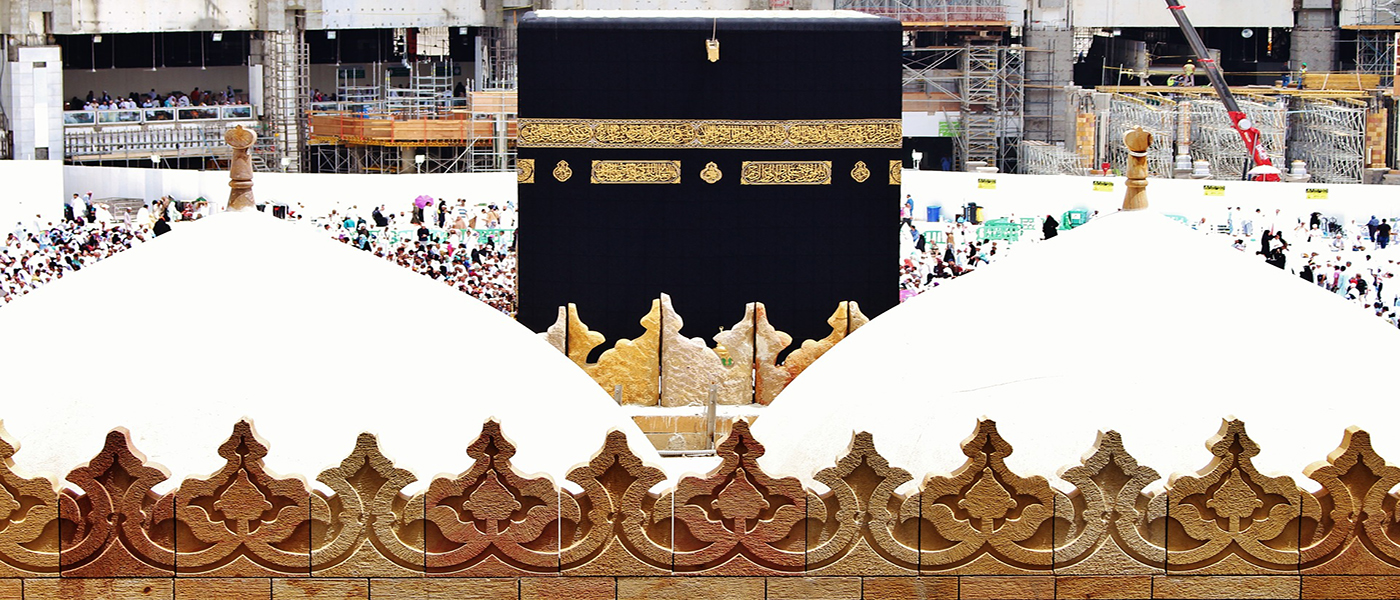

Imitation and Marja’ Taqlid in Islam
Faith in the religion of Islam is based on rational thinking. Quranic teachings always encourage people to achieve faith through reasoning and do not consider mere devotional cognition as adequate. Hence one should accept the Islamic axioms (Monotheism (Tawhid), Prophethood (Nubuwwah), and Afterlife (Ma’ad)) logically.
The above-mentioned Islamic axioms are constant, immutable, and limited, whereas new events and issues of each time are changeable and infinite. Consequently, there needs to be some Islamic scholars or experts who know the Islamic teachings in general and are aware of the contingent issues of the time and their solutions in particular, which makes them responsible for inference of new laws from basic principles of Islam (Ijtihad) in accordance with the needs of changing times and the requirements of new phenomena of human civilization [1].
On the other hand, the Integration of different people to Islam with their particular way of thinking, living with leaders of various religions, the religious discussions between them and the Muslims, and the appearance of Islamic philosophy would always arise doubts and uncertainties. So it necessitated research on the principles of Islam and justifying them especially after the time of the last Prophet (PBUH) and the Imams.
Muslim scholars have always proved that the Islamic teachings are dynamic, compatible with the passage of time, and capable of fulfilling the requirements of each age, generation, and civilization; this would, in consequence, develop the Islamic society and lead it through the path of evolution and perfection in many parts of the world, especially in the first centuries.
Ijtihad
The literal meaning of Ijtihad is to do one's utmost while striving and making effort to reach a goal which in this case is to endeavor to deduce the divine laws of Islam from the reliable sources and proofs, i.e. the Holy Quran, the historical tradition (Sunnah) [i], consensus (Ijma`) [ii], and reason (`Aql).
The term Mujtahid (the religious expert), derived from Ijtihad, refers to a person who endeavors in the way of Allah to derive laws and decrees regarding the religious fundamentals through all kinds of hardships and difficulties.
Ijtihad, which is of great importance in the religion of Islam, guarantees its persistence. Muslims have always been urged to study Islamic science and everything else which is necessary for the development and well-being of their society.
However, it is not compulsory (Wajib) for every single Muslim to become a religious expert (Mujtahid) due to its difficulty and some people’s inability to comprehend and derive Islamic laws all by themselves. It means that the obligation is on the community as a whole and so when a group of people devote themselves to the science of religion to guide the Muslims, then the obligation is lifted from the rest of the society [2].
Quran says: “why should not there go forth a group from each of their sections to become learned in religion, and to warn their people when they return to them, so that they may beware?” (9:122)
It is noteworthy that even though it is a sufficiency duty, every single person in the Islamic community can learn the science of religion and do Ijtihad individually. Therefore this science is not associated with a particular class of the society; rather, it only depends on acquiring the necessary knowledge and intellectual skills. So if a Muslim is not capable of attaining such level of knowledge that would enable him/her to deduce religious laws for himself/herself, it is compulsory for them to refer to an expert who has specialized in this field, i.e., Mujtahid.
Mujtahids
A fully qualified religious expert (Mujtahid), who is supposed to study and deduce the practical laws of Islam according to the time requirements, needs to have specific features, the most significant of which are:
Being able to fully understand the Holy Quran and the other religious sources to discover practical laws from their origins.
Being equitable and trustworthy
Being capable of refraining from sins
Being able to keep away from earthly desires
It is also important to bear in mind that the religious experts (Mujtahids) do not ever issue a decree (Fatwa) unless they have found adequate and reliable proofs and evidence in the Quran, historical tradition (Sunnah), reason, and consensus; which is when they inform the people of God’s commandments.
Imitation (Taqlid) in Islam
Taqlid in Islam literally means "to follow or imitate someone" in the realm of religious do’s and don’ts or the religious laws one must obey. In Islamic terminology, it means to comply with the edicts of a religious expert (Mujtahid) regarding practical affairs of religion. Broadly speaking, imitation is classified into four different categories among people:
An unlearned following another unlearned
A learned following an unlearned
A learned following another learned
An unlearned following a learned
Quran, however, mentions two of the above; “an unlearned following another unlearned,” which is strictly prohibited:
“For when they are told, "Come unto that which God has bestowed from on high, and unto the Apostle" - they answer, "Enough for us is that which we found our forefathers believing in and doing." Why, even though their forefathers knew nothing, and were devoid of all guidance?” (5:104)
And that of “an unlearned following a learned” (the focus of this article):
“Ask the People of the Book if you do not know” (21:7)
In Islamic thinking, the latter is the only acceptable kind of Taqlid in Islam that appeals to man's rationale. According to common sense, we follow the guidance of a religious expert (Mujtahid) who knows the laws of religion, just as we voluntarily conform to the advice of a doctor when we need medical attention, or in the same way, we consult lawyers and comply with their recommendations. It is inherent in man's nature to resort to experts in fields wherein he lacks expertise.
Practical matters of faith are no different. We, therefore, comply with an expert in the field of practical religious affairs too [3]. In this kind of Taqlid in Islam, which is permitted in Islam, two important elements are involved; firstly, the imitator (Muqallid) must completely trust and have confidence in the religious expert (Mujtahid). Secondly, imitation (Taqlid) must fulfill the imitator’s (Muqallid) demands and lead him/her to perfection. Clearly, this does not make sense in the other forms of imitation (Taqlid) but the last one.
In short, the religious concepts and teachings of Islam fit into two main parts; the axioms and the practical commandments (practical principles). As for the Islamic axioms, i.e., Monotheism (Tawhid), Prophethood (Nubuwwah), and Afterlife (Ma’ad), no one is allowed to imitate; instead, each person is supposed to investigate and accept them individually since they are regarded as the main entrance to the religion of Islam.
But about Practical principles, which are obligatory practical commandments, Muslims are encouraged to investigate and find them out as individuals if they are able to do so; obviously, they are not allowed to imitate anyone. If they are not capable, though, they have to follow religious experts (Mujtahid) who have become specialized in Islamic science fully and deeply.
It is learned in this article that the cases in which Taqlid in Islam or imitation is allowed, are very limited in Islam. In fact, it is possible for every single Muslim to step on the path of investigation to attain knowledge and awareness about the truth and commandments of Islam themselves.
Notes:
[i]. the primary source of law taken from the sayings, actions, and approvals of the Prophet Muhammad (PBUH)
[ii]. acceptance of a matter by a specified group of Muslim scholars
References:
Share This Article

Four Questions You Might Ask about Hajj
Hajj is the most glorious manifestation of Muslims' unity, where millions of Muslims say "Yes" to the divine invitation and come together around the Kaaba in Mecca. You might have already read about the philosophy of Hajj and the details around it. Here, we answer some questions that you might want to know more about Hajj.
1. Who Built Kaaba and Why?
According to most of the references, Kaaba was first built by Adam (PBUH). Later on, in the era of Noah (PBUH), when a flood occurred throughout the whole Earth, Kaaba was not completely ruined but damaged. Some years later, the location of the Kaaba was shown to Prophet Abraham (PBUH) [1]. He had the mission to reconstruct Kaaba with the help of his son Ishmael (PBUH) [2]: "As Ibrahim raised the foundations of the House with Ishmael, [they prayed]: 'Our Allah, accept it from us!'" (2:127). According to the verses of the Quran, the reason to build Kaaba was to found a place of reward for humankind and a sanctuary [3] where people come to worship Allah: "And proclaim the Hajj to people" (22:27).
2. Who Can Perform Hajj?
As one of the practical principles of Islam, Hajj is obligatory only once in one's lifetime, if he/she fills some conditions that consist of:
To be of sane mind;
To have reached puberty;
To be free;
To have financial means (called Istita'ah), i. e., to have enough money to support oneself and his/her family on this journey;
To be in good physical condition, i. e., Hajj is not obligatory for the sick, the extremely old who cannot even move or those who are either unable or would face severe hardship;
To possess means for a safe trip.
If one fulfills all these conditions, then it is mandatory for him/her to perform Hajj.
3. Why Is the Phrase "Labbayk" Repeated?
Labbayk means "I am abiding upon your compliance" and is used to answer in the affirmative, to agree with, and accept an invitation [4]. The phrase Labbayk is one of the obligations during Hajj by saying which one can enter the state of Ihram [5].
According to Imam Kazim (AS), Allah Almighty will forbid the Hellfire to those who entered the state of Ihram during Hajj. Saying "Labbayk Allahumma Labbayk" is actually an answer to Almighty Allah in return to what He has said." [6]. In another narration, it is stated that this phrase is an answer to the call of Almighty Allah (22:27) to perform Hajj [7].
4. How Is Hajj an Expression of the Beliefs of Islam?
Hajj is the most significant congregation of Muslim society from all over the world that manifests how religion and society are linked. The rituals that must be performed during Hajj and the words that should be repeated remind us of:
Monotheism: the fundamental axiom of Islam that implies the existence of one creator, a divine source, and a higher power, and His absolute uniqueness and singularity;
Denial of all other powers: by testifying to monotheism, every other power, whether eastern or western, will be rejected. That means those who believe in monotheism won't be indifferent about the injustice, cruelty, and oppression that world powers inflict on their people or other countries;
The importance of unity: millions of pilgrims who have left behind the religious conflicts, and follow the same intention, perform the same actions, and wear the same outfit, represent the glorious Islamic unity;
International peace and amity: bringing together the people of various nationalities, skin colors, languages, and sects and considering all of them equal except for their degree of piety, encourage brotherhood and peace in the whole world.
Here we discussed some of the common questions about Hajj, but there is much more to know. If you have any questions in this regard, do not hesitate to write to us.
References:
- The Quran (22:26)
- N. Makarem Shirzi, “Tafsir Nemooneh”, vol. 14, p. 67.
- The Quran (2:125)
- Hajj
- M. Bahjat, "Manasik Hajj va Umrah", p. 90.
- Shaykh H. Amili, “Wasa'il al-Shia”, vol. 12, p. 375.
- Shaykh H. Amili, “Wasa'il al-Shia”, vol. 12, p. 377.
Read More

What is the Philosophy of Prayer in Islam? Part 1
Prayer in Islam (Salat) is the most important practical principle such that no one can be exempted from [i]. Soldiers involved in a war, patients in hospitals, passengers on airplanes or ships, all should perform the prayers (Salat) even with some modifications based on their circumstances. Of course, Islam has placed a lot of emphasis on prayer for some reasons. These reasons are reviewed in this article as the Philosophy of Prayer in Islam.
The Philosophy of Prayer in Islam, A Practical Principle of Islam
According to Prophet Muhammad (PBUH&HP): “The prayer is the pillar of religion, and its parable is that of the prop of a tent – when the prop remains upright, the pegs and ropes remain straight and upstanding, but when the prop bends or breaks neither the pegs nor the ropes remain upright” [2]. This statement highlights the importance of the prayer in Islam.
The inclination toward goodness and avoiding evils are of the outcomes of practicing the prayers. "Indeed, prayer prohibits immorality and wrongdoing ... And Allah knows that which you do" (29:45). In other words, the prayer in Islam is the base, and every other act of a Muslim is influenced by that.
Two Major Roles of the Prayer in Islam
There are two main roles for the prayer in Islam: the spiritual promoter and the permanent reminder. Prophet Muhammad (PBUH&HP) said: “The prayer of a person is (in reality) a light in his heart, so whoever desires, can illuminate his/her heart (through the prayers)” [3].
Doing the prayers every day, one repeatedly remembers God in intervals, renews his\her promise of servitude to God, purifies him\herself and tries to keep away all the evil thoughts and actions [1]. According to Imam Ali (AS), Evil will be jealous of the person who stands up for the prayer because he sees the Mercy of God encompassing that person [4]. Hence, the prayer as a repeated reminder stops from sins and develops Infallibility.
The Prayer, a Repeated Call
Some discuss that why one should perform the prayers five times a day? Is it to show up every day and remind God that we are there and we are His servants? Of course not! As stated earlier, it is to remind us of God unceasingly and to remember that we are His servants. If one forgets for an instant that He is present everywhere and observes us (“Neither drowsiness befalls Him nor sleep” (2:255)), he\she might be easily at the risk of committing evil deeds. These evil deeds might be harmful to either oneself or even others. So, the prayer has both the individual and social consequences.
A real prayer has some prerequisites; cleansing through ablution (Wudu), standing in the presence of God with the whole heart and body, not wearing usurped clothes or not performing the prayer in a usurped place, etc. According to Imam Ali (AS), the prayer will not be accepted if the clothes of a person and where he\she does the prayer are not lawful (Halal) [5]. Moreover, Imam Ali (AS) said that whoever performs the prayer and perceives what he\she is doing and saying, his\her sins will be forgiven once the prayer ends [6].
All these demonstrate that the attempt for performing a true prayer results in several accomplishments such as respecting the rights of others, purity of the appearance and the inner self, etc. Having fulfilled all these conditions, one could meet the divine requirements and reach the happiness promised through performing a “complete prayer”.
No Substitute for the Prayer in Islam
Some people suppose that they do not need to perform the prayers. They say that serving the human beings who are the creatures of God equals worshipping God. They claim that there is no need to do the prayers as an act of worship. Instead, they try to do good to other humans. To answer, the prayer is a support for the morals and social principles. As stated above, it reminds us of the ethical behavior, the social responsibilities that one has towards others, and prevents from doing wrong to others [1]. Hence, the prayer can never be replaced with any other good deed.
Notes:
[i] The only exception is about women during menstruation.
References:
- Shaikh al-Hur al-Aamili, "Wasail al-Shia", p. 214.
- A. al-Hindi, “Kanz al-Ummal”, vol. 7, T. 18973.
- Allama Majlisi, “Bihar al-Anwar”, vol. 82, p. 207.
- H. Harrani, "Tuhaf al-Uqul", p174.
- " Makarim al-Akhlaq", p. 300.
Read More

